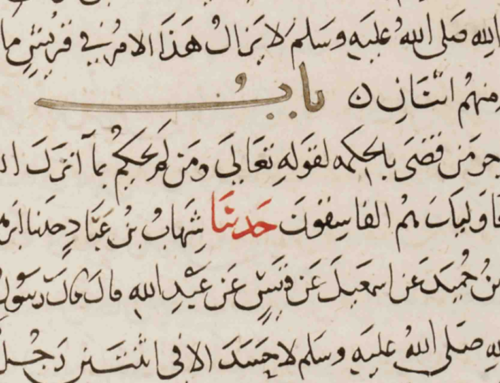Translated by Muhammadullah Khalili Qasmi. Edited by Saad Khan.
One of the difficulties in the science of Qur’anic commentary is to know which are the abrogating verses (nasikh) and which are the abrogated ones (mansukh). This subject has been discussed at length with considerable disagreement [among Muslim scholars]. One of the main reasons behind the difficulty of this subject is the difference of opinion between the early and later scholars about the technical meaning of the word naskh (abrogation).
Abrogation According to the Early Scholars
What is known from some investigation into the speech of the Companions and the Followers is that they used the word abrogation in the common linguistic sense, namely, the removal of one thing by another, and not in the sense taken by legal theorists [i.e., that one verse has abrogated another verse and it is not acceptable to act upon that verse anymore]. The meaning of abrogation, according to them, is the “removal of some of the qualities of one verse by some other verse,” whether the removal be because:
1. The time for acting upon the abrogated verse has come to an end;
2. The speech has been diverted from the most likely meaning to a less one;
3. The condition is only accidental [not exceptive];
4. The general import is particularized;
5. The explanation of what differentiates the textual (mansus) and the one which is plainly analogical;
6. One of the pre-Islamic pagan customs has since become extinct;
7. The abrogation of any previous sacred law (Shara’i).
Thus, the subject of abrogation became very vast and its scope widened. There is considerable difference of opinion about it. This is why some commentators have elevated the number of abrogated verses to as high as five hundred. But if you think a bit more deeply, you will find that verses of this sort are near countless.
Abrogation According to the Later Scholars
As regards the verses considered abrogated according to the technical meaning taken by the later scholars, their number is small, particularly in light of the assessment we have made. Shaykh Jalal al-Din Suyuti, after considering the views of some of the learned scholars about them, has given a full account of them in his Itqan. He has noted down the verses which are taken as abrogated by the later scholars in agreement with the view of Qadi Abu Bakr ibn al-‘Arabi, and settled their number at approximately twenty. But I have a different opinion about some of these twenty as well.
Al-Fawz al-Kabir fi Usul al-Tafsir, translated into Arabic by Salman al-Husayni al-Nadwi, p.81-84
Note:
[Shah Waliullah al-Dahlawi states in another place in Al-Fawz al-Kabir that abrogation can only be ascertained in five verses according to the meaning taken by the later scholars. He offers an explanation for the remaining fifteen verses that were considered abrogated by Jalal al-Din Suyuti and others, and demonstrates why those verses are not in fact abrogated.
For example he writes that the verse “As for those with whom you have made a pledge, give them their shares. Surely, Allah is Witness over everything” (4:33), is said to have been abrogated by the verse “As for the womb-relatives, they are closer to one another according to the Book of Allah. Surely, Allah is aware of everything” (8:75). He comments, “Here I must state that the verse apparently means that the inheritance is intended for the clients (mawali), while doing good and maintaining connection are meant for the master of clientship. As such, there is no abrogation here.”
On another verse, he comments, “‘The adulterer shall not marry save an adulterous or an idolatress, and the adulteress none shall marry save an adulterer or an idolater. All that is forbidden unto believers’ (24:3), is taken as abrogated by the verse ‘Arrange the marriage of the spouseless among you, and the capable from among your bondmen and bondwomen’ (24:32)”. He then goes on to say, “I am to state that Imam Ahmad has followed the outward meaning of the verse, while its meaning according to other scholars is that the doer of a great sin is not fit but for the adulteress or that it is not desirable to take the adulteress in marriage. The words of the verse (‘All that is forbidden unto believers’) is a hint toward adultery and polytheism. Hence, there is no abrogation here.”
Following are the five verses that are considered abrogated by Shah Waliullah al-Dahlawi: (1) Al-Anfal 65 by Al-Anfal 66; (2) Al-Mujadilah 12 by Al-Mujadilah 13; (3) Al-Baqarah 180 by Al-Nisa’ 11; (4) Al-Ahzab 50 by Al-Ahzab 52; (5) Al-Muzzammil 1 by Al-Muzzammil 20.
However, Mufti Sa’id Ahmad Palanpuri writes while quoting Mawlana ‘Ubaydullah Sindhi, “Thus, according to this term, Shah Sahib sees no verse of the Qur’an as abrogated. But it should be noted that the statements of Shah Waliullah in this regard is wise; in view of the condition of people, he attempted to gradually explain this matter to them.”
Mufti Palanpuri goes on to say, “‘Allamah Sindhi (may Allah have mercy on him) wants to say that no verse, according to Shah Waliullah, is abrogated. But had he expressed this opinion all of a sudden, it would not have been acceptable to the people. Therefore, he wanted to take people gradually to the concept that the Qur’an underwent a process of abrogation, but there is no verse in the present Qur’an which is altogether abrogated.” [1]For more on this topic see Shah Waliullah awr un ka Falsafah by Mawlana ‘Ubaydullah Sindhi, Sharh al-Fawz al-Kabir by Mufti Sa’id Ahmad Palanpuri, and Bulghat al-Hayran of Shaykh Husayn ‘Ali … Continue reading (Sharh al-Fawz al-Kabir, p.275)]
| ↑1 | For more on this topic see Shah Waliullah awr un ka Falsafah by Mawlana ‘Ubaydullah Sindhi, Sharh al-Fawz al-Kabir by Mufti Sa’id Ahmad Palanpuri, and Bulghat al-Hayran of Shaykh Husayn ‘Ali al-Punjabi. |
|---|






